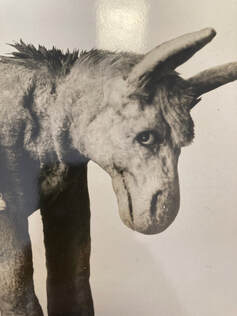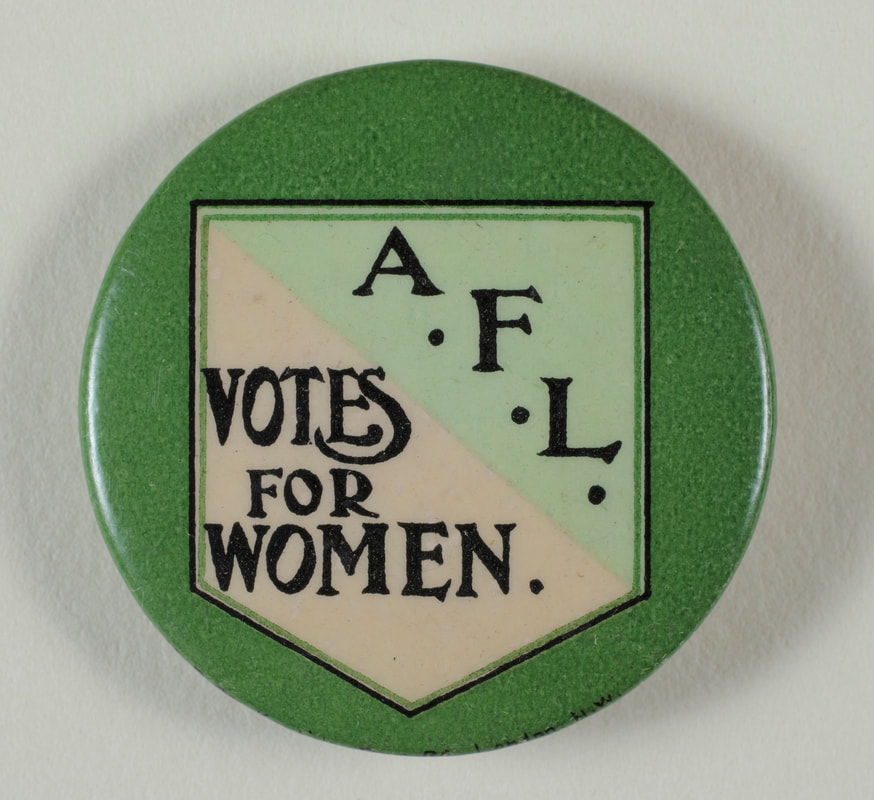|
You may be familiar with accessing books, archive collections, or microfilms at the British Library, but it can be daunting to look for and order play manuscripts if you haven't done so previously.
The staff in the Manuscripts reading room are really helpful, but I thought a users guide for any first-time researchers wanting to look in the Lord Chamberlain's Plays Collection might be useful so that you know what to expect and ask for. So here we go:
0 Comments
In April 2022 I was in the University of Bristol Theatre Collection researching the London cabaret scene of the early to mid twentieth century when I saw this face peeking out at me from an open folder of programmes and cuttings. I was immediately intrigued! The full picture was, I assumed, a publicity shot for a cabaret act, a play, or perhaps even a film.
Another curio from the Lord Chamberlain's Plays Collection - a sketch performed at the Lewisham Hippodrome in April 1913 and set at an unnamed London Underground station, in which the Devil (later revealed to be a medical student in costume as Mephistopheles) and his wife (later revealed to be a nurse in costume as a Folly) are waiting for either a tube train or an airship to take them home. About halfway through the piece the Devil brags to a Policeman that he is inciting militant suffragettes to commit violent crimes. As he is getting arrested a suffragette runs in, puts something into a handily adjacent post box that sets it on fire, shouts "Votes for Women" and runs off, pursued by the Policeman. There's a reference to the Devil's wife being a hunger-striker too. Curious!
The Actresses’ Franchise League (AFL) was founded in November 1908 by theatre professionals who wanted support the Votes for Women cause through their work. Any woman who was or had been in the profession was eligible to join, and the broad membership included many of the most famous actresses of the early twentieth century including Ellen Terry, Lily Langtry, Madge Kendal, as well as those who would go on to become well known after WW1, including May Whitty, Athene Seyler and Sybil Thorndike. The membership also included writers Gertrude Jennings and Cicely Hamilton, musicians Ethel Smyth and Liza Lehmann, theatre managers and producers Lena Ashwell, Edith Craig and Gertrude Kingston, singers Yvette Guilbert and Marie Brema, dancers Margaret Morris and Italia Conti, and music hall artistes Marie Lloyd and Kitty Marion. American actress Gertrude Elliot, the wife of suffragist actor-manager Johnston Forbes-Robertson, was the President of the League. By 1914 there were nearly a thousand members of the AFL, provincial secretaries in cities across the UK, an affiliated Men’s Group and over 100 Patrons, including Christabel Pankhurst. The League's sister society, the Women Writers' Suffrage League, was also founded in 1908.
The Actresses’ Franchise League worked with all the other suffrage societies - militant and non-militant - and was present for all of the most prominent events in the suffrage campaign between 1908 and 1914, organising performances at suffrage exhibitions and fairs, training and providing speakers for meetings and demonstrations, marching in processions, and putting on entertainments in theatres, restaurants, meeting rooms and even skating rinks. The AFL commissioned and published new writing, campaigned directly as an activist group alongside other suffrage societies and used the unique visibility and profile of its membership to gain press attention for the cause. Believing strongly in the power of theatre, propaganda and storytelling, the League’s output was ambitious, bold and hugely varied. In 1913, the AFL founded The Woman’s Theatre, designed to open up opportunities for women to be part of the business of theatre and to participate at every level, on and off stage. After a very successful first season, plans for a second had to be postponed due to the outbreak of the First World War. League members threw themselves into war work – founding the Women’s Emergency Corps and the British Women’s Hospital Fund, and restoring the original Star and Garter home in Richmond for disabled servicemen. The Woman’s Theatre became the Woman’s Theatre Camps Entertainments, taking variety shows that included short one-act comedies by suffragist playwrights to army camps in the UK and abroad. After the war, the League continued to work for equal suffrage, and the organisation remained actively involved with and supportive of a variety of campaigns until it was wound up in 1958. The League’s legacy is an inspiring one for scholars of feminist theatre, political theatre, theatre history and women’s history, as well as for current theatre professionals. Many of the issues around equality of opportunity within the industry are still pertinent today – and the AFL’s confident, clever, passionate and creative work and story still resonates with performers, audiences and activists. All images by Jacky Fleming I'm collaborating with Scary Little Girls for the fourth season of their Salon de la Vie project - on everything you didn’t know about the suffragettes and their creative campaigning! We’ll combine recorded extracts, songs, special guests and live shows in this season to celebrate the wild, wonderful, wise and witty women of the first wave.
Join us for… June 2nd, Votes for Children! A look at the young people who supported the suffrage movement and found their own voice in the process. June 16th, Birds of a Feather. We will hear about plans to fill Parliament with suffragette parrots, talk about how the movement campaigned not just for votes for women but to end vivisection, and explore the links between vegetarianism and suffrage. June 30th, Nobody Expects the Suffragettes! Site specific, pop up and random acts of activism all characterised the creative shenanigans of suffragists in the theatre and entertainment industries, and in this Salon we celebrate some of the most unexpected! July 14th, The Woman’s Theatre. Here we will look at the way suffrage campaigners imagined a theatre they could be part of, including female producers and playwrights, crèches, and an end to the casting couch… so much to admire and yet to apply to the modern mainstream… July 28th, Taking the Stage! Our all live season finale bringing the work of Elizabeth Robins, Evelyn Glover and Cicely Hamilton to life before your very eyes! Expect digital mayhem, songs, short scenes and feminist fun for all! Tickets for this £5, the only Salon of the season we’re charging for and we are super grateful for your support! About Salon de la Vie Now coming up to its fourth season, Salon de la Vie is our fortnightly series of 15 – 20 minute extravaganzas of songs, storytelling, merriment and conversation. Focusing each time on an awe-inspiring, remarkable and brave human from the world of film, music, literature and history, and drawing parallels with the achievements of activists today, we celebrate how people positively embody the change they want to see in the world, for themselves and for others. Reading Twenty-Two - 29th March 2021
An Anti-Suffragist or The Other Side by H.M. Paull (1910) Lord Curzon’s 15 Good Reasons against the grant of female suffrage (1909) Miss Appleyard’s Awakening by Evelyn Glover (1911) Showin’ Samyel by Evelyn Glover (1914) The Woman of It, or Our Friends the Anti-Suffragists by Mary Shaw (1914). Readers: Sarah-Louise Young, John Fleming, Jamie Newall, Charlotte Moore, Kathryn Martin, Lucy Stevens, Annie Walker, Philippa Ritchie, Maggie Saunders, Maroussia Richardson, Stephanie Ware, Jemma Churchill, Velma Von Bon Bon, Sarah Annakin, Michelle Claire. Reading Twenty-Three - 28th April 2021 Mary Edwards by P.R. Bennett (1911) Pot and Kettle by Cicely Hamilton and Christopher St John (1911) For One Night Only by G.B. Stern (1911) Readers: Catherine Harvey Green, Jamie Newall, Annie Walker, Lucy Stevens, John Fleming, Sarah Annakin, Kathryn Martin, Maslen George, Stephanie Fayerman. Reading Twenty - 23rd February 2021
Act Three of Woman on Her Own by Eugene Brieux, translated by Charlotte Shaw (1913). Readers: Sarah Annakin, Lucy Stevens, Mufrida Hayes, Sarah McCourt, John Fleming, Michelle Claire, Maggie Saunders, Annie Walker, Kathryn Martin, Jemma Churchill, Stephanie Fayerman. Reading Twenty-One - 22nd March 2021 Lady Geraldine's Speech by Beatrice Harraden (1909), Her Vote by H.V. Esmond (1909) A Suffrage Rummage Sale - An Auction Interrupted by Mary Winsor (1913). Readers: Sarah Annakin, Velma Von Bon Bon, Stephanie Ware, Maroussia Richardson, Lucy Stevens, Juliette Burton, John Fleming, Michelle Claire, Jemma Churchill, Philippa Ritchie, Nick Dutton, Maggie Saunders, Catherine Harvey Green, Jamie Newall. Reading Eighteen - 18 February 2021
The Apple by Inez Bensusan (1911) Edith by Elizabeth Baker (1912). Readers: Catherine Harvey Green, Natalie Harper, Annie Walker, Jamie Newall, Sajeela Kershi, Maggie Saunders, Velma Von Bon Bon, John Fleming, Jemma Churchill, Stephanie Fayerman. Reading Nineteen - 23rd February 2021 First two acts of Woman on Her Own by Eugene Brieux, translated by Charlotte Shaw (1913). Readers: Philippa Ritchie, Michelle Claire, Nick Dutton, Bronwyn Elizabeth, Velma Von Bon Bon, Sajeela Kershi, Lucy Stevens, Rachel Creeger, Annie Walker, John Fleming,\Stephanie Fayerman. Reading Sixteen - 17th December 2020
'Our Own Twelve Anti-Suffragist Reasons', 'Why We Oppose Pockets for Women', and 'Fashion notes: Past and Present' from Are Women People? by Alice Duer Miller (1915) Prologue for a Women's Theatre by Israel Zangwill (1911) Women Do Not Want It by Charlotte Perkins Gilman (1897) 'Cautionary Tales in Verse' from Votes for Women, 6 October 1911 Readers: Maggie Saunders, Sajeela Kershi, John Fleming, Catherine Harvey Green, Annie Walker, Philippa Ritchie, Sarah McCourt, Jamie Newall, Sarah Annakin, Lucy Stevens, Jemma Churchill, Stephanie Fayerman. Reading Seventeen - 26th January 2021 10 Clowning Street by Joan S. Dugdale (1913) Little Jane and Grandmama and Fair Play by Lorimer Royston (1914) Readers: Jemma Churchill, Bronwyn Elizabeth, John Fleming, Luke Meredith, Genevieve Swallow, Catherine Harvey Green, Lucy Stevens, Maggie Saunders, Annie Walker, Jamie Newall, Sarah Annakin, Philippa Ritchie, Sarah McCourt. |
NaomiThoughts, reflections, bits of research Archives
April 2023
Categories
All
|


 RSS Feed
RSS Feed